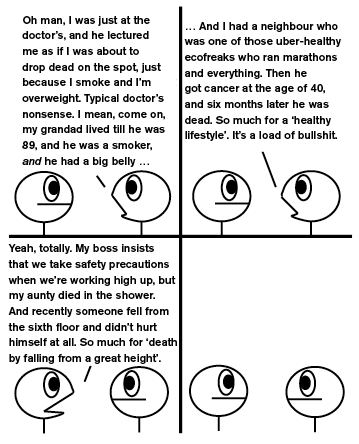
Thin people can get sick, too
This habit of downplaying dangers is the same for all behaviours that are named as unhealthy, such as smoking, drinking, and taking drugs — and, as I have already mentioned, I convinced myself it was true for long enough. Having one or even several risk factors, of course, doesn’t mean that you will necessarily be affected, but the fact is that your risk is increased — especially when it is already higher for other reasons.

Different people are built differently and have different weak spots. I, for example, am prone to urinary tract infections, apparently because my urinary tract has an unfortunate kink in it. Sitting on cold surfaces increases the risk of contracting urinary infections for anybody, but for me, five minutes is enough to give me an infection, where others might only start to find it a problem after five hours. Of course, someone could easily come along and say, ‘I often sit on the cold floor, but I never get urinary tract infections, and Nadja hardly ever sits on cold surfaces — and when she does, it’s only for five minutes — and she’s always getting urinary tract infections. Clearly, cold surfaces have nothing to do with it. In fact, it might be better for Nadja if she sat on the cold floor more often.’
Anyone who is prone to certain health problems — if their parents or grandparents suffered from diabetes or heart disease perhaps — or anyone who has sustained an injury that made them liable to problems with their joints, will be all the quicker to feel the consequences of the permanent strain that excess weight puts on their system.
A study by Grover et al. from 2015 compared the health and life expectancy of people in different weight categories. The interesting thing about this study is that it counted not only the years of life lost, but also the number of healthy years lost, thus taking into account quality of life to some extent. The results concern only the greatest threats to life, namely diabetes and cardiovascular disease. The study found that slightly overweight people, if they were already overweight as young adults, lose up to 2.7 years of life and 6.3 healthy years. For obese people, the loss of life-years rises to up to 5.9 and the loss of healthy years can be up to 14.6. For severely obese people, death comes up to 8.4 years earlier, and an average of 19.1 years of health are lost.
If it was just a question of when you meet your death, some might say, ‘Okay, so I’ll die five years earlier, but at least I’ll have enjoyed life!’ But when you spend the final decades of your life bedridden and in chronic pain, which often involves being permanently reliant on care, there cannot really be any talk of enjoying life.
Personally, I hate having to ask other people for help and I can’t stand not being able to do things for myself, so I must admit that I find the loss of healthy years to be a much more persuasive argument than ‘just’ the prospect of maybe dying a couple of years earlier. In my professional life, I have worked with patients suffering from chronic pain and illness and I know from first-hand experience how much that can impinge on those people’s lives, especially as their condition worsens.
In my own case, by the way, the phrase ‘Okay, so I’ll die five years earlier,’ was a huge understatement, since I already had a BMI of 50 when I weighed 150 kilos. According to a new study (Kitahara et al., 2014), being extremely overweight can shorten a person’s life by up to 13.7 years, making it more deadly than smoking.